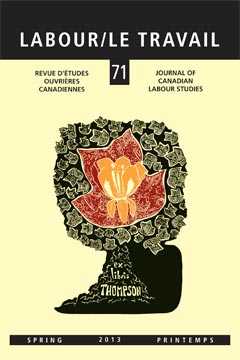Abstract
Working-class political activity at the municipal level in Regina began in 1914 on the initiative of members of the Regina Trades and Labour Council. Early on trade unionists reached out to the city’s middle class, and together they founded a succession of Labour political parties in the 1920s. After 1930 members of the Canadian Brotherhood of Railway Employees also became involved. Success came in 1935, when the Civic Labour League, an informal alliance of social democrats and communists, won the mayoralty and a majority of the aldermanic seats on city council.
Labour maintained its hold over City Hall until the end of the decade, but it did not accomplish much. It could not convince the province’s Liberal government to take over full responsibility for the cost of relief or enact a special city charter that would give Regina wider powers (to construct social housing for example) and new sources of revenue. Then in 1939 Labour’s political fortunes shifted dramatically. Accusations of communist influence in the selection of the Labour slate played into the hands of the city’s business community, Regina’s daily newspapers, and the Civic Voters’ Association, which was founded on the eve of the civic election, and Labour suffered a crushing defeat.
La classe ouvrière commence à s’impliquer en politique municipale à Regina en 1914 avec les membres du Regina Trades and Labour Council. Au début, les syndicalistes rassemblent les familles de la classe moyenne autour d’eux et ils fondent ensemble plusieurs partis politiques travaillistes au cours des années 20. Après 1930, les membres de la Fraternité canadienne des employés des chemins de fer s’engagent à leur tour. La victoire vint en 1935, lorsque la Civic Labour League, une alliance informelle entre les sociaux-démocrates et les communistes, remporte la mairie et la majorité des sièges au conseil municipal.
Aux commandes de l’hôtel de ville jusqu’à la fin de la décennie, les travaillistes n’atteignent pas les résultats escomptés. Ils échouent à convaincre le gouvernement provincial libéral d’assumer les coûts de la totalité du budget de secours ou de promulguer une charte municipale qui leur aurait donné davantage de pouvoir (pour construire des logements sociaux par exemple) et procuré de nouvelles sources de revenu. En 1939, la bonne fortune politique des travaillistes prend subitement fin. Les communistes sont accusés d’avoir influencé le processus de sélection des candidats de la liste travailliste. À la une des quotidiens de Regina, ces accusations jouent en faveur des gens d’affaires de la ville et de la Civic Voters’ Association, qui avait été fondée à la veille des élections municipales, et les travaillistes essuient une cuisante défaite.
